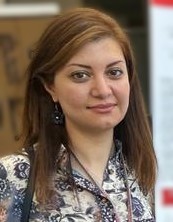Research Cafe: Jay Joshi & Elaheh Hosseini
Event Description
Research Cafe: March 20, 2024
3:00 - 4:00pm
On Zoom
1.) "Cell Cycle-Dependent Oscillations in the Master Metabolic Regulator mTOR Complex 1" by Jay Joshi

Abstract: Mechanistic Target of Rapamycin Complex 1 (mTORC1) is a master metabolic regulator that integrates nutrient and hormone signals to control cellular growth. mTORC1 dysregulation contributes to the development and progression of many diseases, including most human cancers. mTORC1 is activated in most proliferating cells, but whether mTORC1 is regulated in a cell cycle-phase specific manner is unknown. We hypothesized that mTORC1 activity changes throughout the cell cycle to meet the unique metabolic and biosynthetic demands of each cell cycle phase. Using multiple independent methods to track mTORC1 activity throughout a complete cell cycle, we find that mTORC1 activity oscillates from lowest in mitosis/G1 to highest in S-phase and G2. Cell cycle regulation of mTORC1 appears to be mediated through changes in subcellular localization of an essential negative regulator of mTORC1 called the TSC complex. Inhibiting mTORC1 in G2 delays mitotic induction, revealing a novel role for mTORC1 in potentially driving cell growth to satisfy the G2/M checkpoint. Taken together, our data uncover cell cycle-dependent oscillations in mTORC1 activity and suggest that mTORC1 could have phase-specific functions in promoting cell growth and proliferation.
Speaker Bio: I am a third year PhD candidate in the Cellular and Molecular Pharmacology graduate program. My thesis advisor is Dr. Alexander Valvezan, and I study the core mechanisms that regulate mammalian cell growth and cell proliferation, focusing specifically on Mechanistic Target of Rapamycin Complex 1 (mTORC1). Prior to graduate school, I was an undergraduate at Rutgers University-New Brunswick, where I majored in Genetics and minored in Psychology. As an undergraduate, I used fruit flies as a model organism to study female reproduction and development. I currently aspire to pursue a career in academia and start my own lab to study cancer progression and therapeutics. Outside of the lab, I enjoy reading (started War and Peace by Leo Tolstoy), hiking, traveling, and playing/watching sports.
2.) "Modulation of epithelial ovarian cancer anti-tumor immunity by a novel cancer cell-intrinsic stress regulator" by Elaheh Hosseini

Abstract: Despite all advances in onco-immunology, ovarian cancer patients’ responses to the immunotherapy approaches are limited which drives us to understand the immunobiology of the ovarian tumor microenvironment (TME). Our laboratory has identified a single nucleotide polymorphism in the gene UHRF1BP1 that is associated with better overall survival for ovarian cancer patients. While the role of UHRF1BP1 in cancer is not clear, preliminary research by our laboratory has revealed that UHRF1BP1 is transcriptionally responsive to mitochondrial stress through the integrated stress response (ISR) in p-eIF2α dependent mechanism. According to our chromatin immunoprecipitation (ChIP)-PCR data in human ovarian cancer cells, ATF4 binds to two sites within the promoter regions of the UHRF1BP1 gene, which is amplified under mitochondrial stress. Additionally, RNA-sequencing pathway analysis in murine ovarian cancer cells reveals that type I interferon (IFN) pathways are upregulated in the absence of Uhrf1bp1. Critically, the extended survival of mice bearing ovarian tumors with dysfunctional Uhrf1bp1 was found to be dependent on CD8+ T cells; suggesting UHRF1BP1 is a novel immunoregulator. These data support our hypothesis that dysfunctional cancer cell-intrinsic UHRF1BP1 promotes unmitigated stress responses in the TME which drives antitumor immunity through dysregulated type I IFN activity. Mechanistically, we postulate that dysfunctional UHRF1BP1 promotes the loss of mitochondrial membrane integrity, which drives type I IFN activity through cytoplasmic sensing of mitochondrial DNA. Collectively, our goal is to establish a new paradigm in our understanding of the immunobiology of ovarian cancer considering cellular stress responses as antitumor immunity regulators.
Speaker Bio: I am a third-year Ph.D. student in Cellular and Molecular Pharmacology. I am an international student and I work in Dr. Kyle Payne's lab in CINJ. The subject of my thesis is studying the dysregulation of cellular stress responses on the immunity of ovarian tumors.
About Research Cafe
Research Café brings together the entire graduate student community of Rutgers University-New Brunswick/Piscataway campus to strengthen scholarly literacy and interdisciplinary research communication by providing a platform for budding researchers to connect, share their in-progress research or scholarship, and benefit from peer feedback in a friendly and low-stakes setting.
Research Café is a monthly, one-hour event. Each event will feature:
- Presentations (10-12 min. each) from two graduate students from across disciplinary areas ranging from engineering and biology to history and anthropology.
- A Q&A dialogue with peers and attendees.
Sign up to attend on Zoom at go.rutgers.edu/researchcafe.3.20.24.
---
Questions? Contact Briana Bivens at bb770@grad.rutgers.edu.